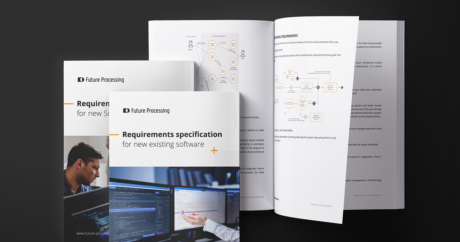Are you going to start cooperating with an IT company? Make sure you base it on a well-prepared software development agreement.
Why is a comprehensive contract template crucial for Custom Software Development?
To save you trouble and help you start the partnership with no unnecessary delays, we prepared a free, extensive template of a software development master agreement.
It will help you cover all the key aspects and define how your project will be delivered. All the important information is divided into sections, e.g., mutual obligations, intellectual property rights, copywrite transfer, confidentiality, etc.
Base your agreement on a template that draws from our 20 years of experience in providing software services to businesses from various industries and has been successfully used in signing many IT contracts. Ensure both parties agree on delivery, timeline, scope, and price.
Types of software development contracts
If you want to ensure the smooth completion of a software development project, choose the right type of contract. Time and materials, as well as fixed-price contracts, are both viable choices, but the ideal option largely depends on the project’s specific circumstances. To help you decide which contract suits your project the most, here are some relevant details and factors that you should consider:
Fixed price contract
Fixed-price contracts involve a clear agreement between the service provider and the client to determine the set cost for the entire project. This model works best when project details are well-defined, and the client seeks cost certainty. However, the service provider takes on more risk in this arrangement, often leading to increased initial quotes to cover potential unforeseen challenges.
The process is generally straightforward but rigid, and any changes require contract renegotiations. Once the initial agreement is settled, client involvement is relatively minimal, as the service provider takes charge of delivering within the agreed parameters.
Time and material contract
In contrast to fixed-price agreements, time and materials contracts offer a more flexible pay-as-you-go model suitable for projects with uncertain or evolving scopes. Clients are charged based on the time spent and resources used. Although this approach enables adaptability to changes, it may lack the fixed-price contracts’ budget certainty.
Moreover, throughout the project, clients are required to participate in guiding the development and providing continuous feedback actively. This ongoing collaboration can result in a final product that aligns better with the client’s evolving needs but requires their involvement and dedication.
What to include in a custom software development agreement?
Creating a comprehensive custom agreement is crucial, not just for setting clear responsibilities and expectations but also for safeguarding both parties involved, especially when it’s between a client and a software development business. This process is about integrating detailed information into a comprehensive contract, which serves as the roadmap for the entire project, ensuring that all bases – financial, legal, and operational – are covered.
Project scope
The agreement should carefully define the project’s scope, including the software developer’s exact expectations, specific job details such as features to be developed, work hour limitations, inclusion or exclusion of maintenance services, and policy on revisions with a specified number allowed.
Moreover, it’s important to specify what the project will not include to prevent any misunderstandings or scope creep. The agreement should also mention any tools, software, or project management methodologies to be used throughout the development process.
Deliverables and acceptance criteria
In this section of the contract, you need to outline the specific criteria that will determine the project’s success. The acceptance criteria should be based on the system specifications and written in clear language.
You must also provide a detailed explanation of the acceptance testing process, including how the software will be evaluated, the duration of testing, and the methods for giving feedback. Depending on the type of contract, it may be necessary to issue a Certificate of Acceptance, confirming that all requirements have been met.
Pricing and payment terms
It is essential to clarify payment terms as they serve as a starting point for potential discussions. This includes stating the total cost, the payment schedule (usually linked to milestones), and specific due dates.
Remember to establish the consequences of missing payments, such as imposing interest, suspending work, or other penalties. For contracts based on time and materials, the developer’s hourly rate, reporting frequency, and work logs should also be communicated transparently.
Non-disclosure agreement (NDA) and non-compete clause
When it comes to safeguarding trade secrets, the contract should specify which data is considered confidential. It should also explain the secure handling of such information. This is important because a breach of confidentiality can have serious consequences, often financial, which should be explicitly stated in the contract.
In addition, a non-compete clause is essential in ensuring that the software provider cannot create a similar product for competitors within a specific timeframe.
Compensation for damages
It is the responsibility of the developer to make sure that the software meets the specified requirements, functions properly, and has no security vulnerabilities or backdoors. If the software fails to meet these criteria, the developer is typically required to fix the issues at no additional cost or compensate for any damages caused. But, for this to be executed, relevant information must be included in the contract.
Intellectual property rights
Another element that must be included in the contract is the definition of the intellectual property ownership that may result from a project. Such ownership includes everything from the source code and unique designs to relevant content created during the project.
The agreement should also have a well-defined procedure for transferring these rights from the software developer to the client. If the project involves open-source components, the software development contract must comply with the licenses of those tools, ensuring that the client understands their rights and limitations regarding this software.
Changes to the contract and dispute resolution
When entering into a software development agreement, it is important to have clear provisions for managing any amendments to the contract. The document should provide a straightforward process for both parties to agree to any changes in writing, allowing for adjustment in project requirements.
Your aim would be to resolve disagreements in a fair and effective manner. The first step is to engage in open and honest communication to find a mutually acceptable solution. If the issue persists, seeking the assistance of an impartial third party through mediation may be necessary. More formal procedures like arbitration or legal action can be considered as a last resort.
Strengthening partnerships through custom software development contracts
The template we prepared is adjusted to the Time&Materials (T&M) type of contracts and Scrum and will work best with these.
Time and Material software contract is one of the most popular types of contract in which the customer pays the supplier for work time (according to the prearranged hourly rate of each team member) and used materials (e.g. using the software license). Such contracts are usually used in short-lasting projects where the scope of the cooperation is hard to define at its early stage.
Launch your IT project quickly and sign an agreement that covers all the necessary aspects. With our software development contract template, you can be sure that the partnership is based on a high-quality contract.
Good luck with your project!
You can read more about custom software development here:


